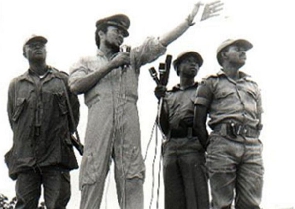- Home - News
- TWI News | TV
- Polls
- Year In Review
- News Archive
- Crime & Punishment
- Politics
- Regional
- Editorial
- Health
- Ghanaians Abroad
- Tabloid
- Africa
- Religion
- Election 2020
- Coronavirus
- News Videos | TV
- Photo Archives
- News Headlines
- Press Release
General News of Sunday, 13 November 2022
Source: www.ghanaweb.com
Why Jerry Rawlings staged a bloody coup in 1979
The events of May 15, 1979 during a mutiny attempt by some junior rank officers of the Ghana Armed Forces set the tone for what would later become a bloody usurping of the then government.
The Supreme Military Council which deposed a democratically elected government in October 1972, witnessed a palace coup which saw General I. K. Acheampong losing his position as the Head of State.
General Acheampong was replaced with his deputy, Lieutenant General Frederick William Kwasi Akuffo to form a new version of the Supreme Military Council.
Despite the promise and plans for elections to be held in June 1979, Rawlings who was a junior officer in the Ghana Air Force with the rank of Flight Lieutenant on May 15, 1979, led six other soldiers to stage a coup against the government of General Akuffo.
Their attempt however failed and Rawlings who was arrested by the military was publicly sentenced to death in a General Court Martial and imprisoned, although his statements on the social injustices that motivated his actions won him civilian sympathy.
While awaiting execution, Rawlings was released from custody on 4 June 1979 by a group of soldiers and subsequently staged a successful coup against the Akuffo Government and the Supreme Military Council.
The immediate actions of the 15-member Armed Forces Revolutionary Council (AFRC) chaired by Jerry John Rawlings included the execution of several senior military officers and former heads of state who had been accused of corruption and contributing to economic decline and impoverishment of the Ghanaian people.
Generals Kotei, Joy Amedume, Roger Felli, and Utuka, as well as the three former Ghanaian heads of state; Acheampong, Akuffo, and Akwasi Afrifa were all executed by firing squad.
The underlining reasons for toppling the government and the subsequent executions that followed largely bordered on corruption by SMC members.
Despite the promise to return the country to civilian rule, the SMC was seen as attempting to hang on to power.
To the likes of Jerry John Rawlings and other junior rank officers, the military had become discredited in the eyes of the public and needed a housecleaning.
Lower ranking members in the military deemed members of the SMC as guilty of corruption and ought to be brought to trial.
The conduct of General Akuffo did not paint a good picture of himself as probes and inquiries into state enterprises by Akuffo’s government saw no actual prosecutions to the dismay of many.
Deposed General Acheampong was also not brought to trial by the SMC II and merely lost his army retirement benefits.
In all, the SMC was deemed as not committed to reforms and that their members were guaranteed immunity in any legal proceedings that were to be brought against them in connection to their dealings and finances.
Beyond the killing of the SMC members, Rawlings later implemented a much wider "house-cleaning exercise" involving the killings and abduction of over 300 Ghanaians.
You can also watch this edition of GhanaWeb Special:
GA/WA











